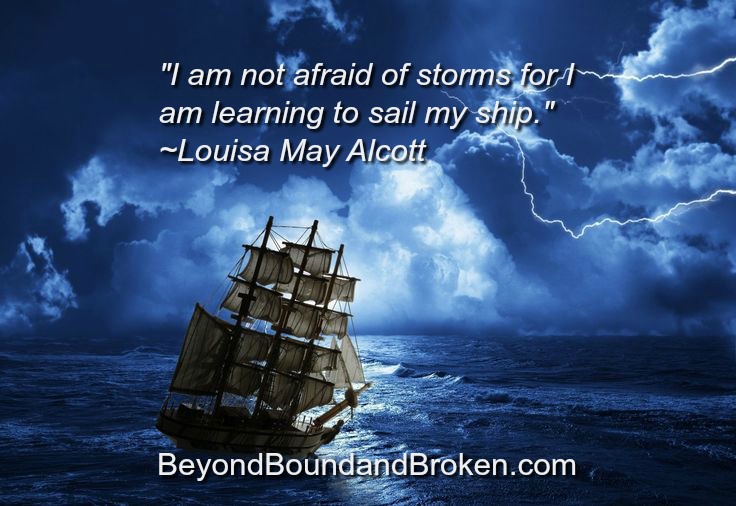Note: This blog is an excerpt from my book, Beyond Bound and Broken.
“The greatest glory in living lies not in never falling, but in rising every time we fall.” ~Nelson Mandela
I learned far too young that life isn’t fair. Raised on an isolated farm in Alabama, I was sexually abused by my father from age 12 – 19. I was dressed up, photographed nude, beaten, tied up, raped, emotionally blackmailed, and psychologically abused. I was forced to play the role of a wife and even shared with other men due to my father’s perversions. Desperate to escape, I left home at 19 without a job, a car, or even a high school diploma.
I don’t think there is “complete healing” here on earth. God gives restoration, but we don’t ever forget or completely get over the effects of our brokenness because it shapes who we are. But, you can find the place of resilience.
I wasn’t always resilient. I don’t think you can learn to be resilient until you have lived through the dark and have come through to the light.

Resilience. Just the word makes you want to sit up a little taller or lift your head a little higher. Resilience is the ability to recover, to spring back, to thrive, and to become strong after, or in spite of, weakness. Resilience in others inspires us, and we admire those who have learned to thrive. Resilience looks glorious when we see it in others because we only see the triumph, not the struggle. We only see the light after the darkness, and in truth, that’s all we want to see. It’s only inspirational when we see the worthwhile fight and the victory.
Some people master resiliency at an early age, while others may not find it until old age. Some never find it. Some people learn to be resilient to some circumstances, but not others.
The journey of resilience can be broken down into three phases. These are emotional stages, not physical ones.
- The first phase is the most difficult. It’s the dark time when you are actively living through despair. I call this the Captivity phase.
- The second phase is the Coping phase where you are out of the worst of the situation, and you are “okay” but still bound and broken inside in some places.
- The third phase is the Conquest phase where you have overcome and can now call yourself resilient.
How fast and how quickly we rise to resilience is determined by our Resilience Factor, our ability to move beyond surviving to thriving. The higher our Resilience Factor, the greater our ability to overcome whatever happens to us in life and move from the Captivity phase to the Conquest phase.
Emotional resilience isn’t dependent on your physical circumstances.
We always have the freedom to choose resilience. Viktor Frankl, concentration camp survivor, said, “The last of human freedoms is the ability to choose one’s attitude in a given set of circumstances.”
We always have the freedom to choose faith over fear. We always have the choice to claim grace and have gratitude. Someone close to me once said, “Freedom is such a sacred thing that not even God Himself imposes His will on any man.”
To be resilient, I had to learn to change my thoughts. There is no reason to spend energy in wishful thinking, fantasizing that my parents had been the parents I wish they had been. I had to accept reality and move on.
It’s so very simple and yet so difficult to do. To move through each phase and ultimately reach our own victory, we must start by changing our thoughts. Our thoughts will determine our feelings, and our feelings start to determine what we do, what we say, and where we end up.
To change my thoughts, I had to change the way I was thinking and what I was thinking. I started to do this by reading books and listening to audios that were focused on thinking positive and how positivity can affect you overall.
Norman Vincent Peale said, “Our emotional life is profoundly regulated by our thought life.”
It’s not that I was a negative person, even when I was in the Captivity or Coping phase. Far from it, I’ve always known on some level keeping a positive outlook and attitude was the only way to be effective in living life and overcoming negativity. I have always tried to identify what I have to be thankful for, rather than reacting to what I have to be bitter about.
It’s not that I’ve ever let myself stay negative for long, but when I became more intentional about positive thoughts, attitude, and intentional personal growth, I rapidly accelerated myself to the Conquest phase. Once you discover a new way of thinking, you can’t go back and un-think it!
You’ve heard it before – “Garbage In, Garbage Out.” When I learned to start changing my thoughts on purpose by focusing on controlling them, rather than letting them control me, I rapidly realized which thoughts didn’t serve me well.
It’s much like realizing you can affect your health by putting good food into your body instead of junk food. If you put good materials into your mind, you can affect your emotional health in much the same way.
I probably take it farther than some people. For example, I’m not very tolerant of Facebook “friends” who post negative words, pictures, or comments. If someone posts something negative, I simply “un-friend” them. I don’t mean someone sharing their struggles, I mean someone sharing something rude, crude, ugly, profane, demeaning or anything along the lines of blaming someone or putting someone else down. I un-friended someone just today for tagging me in a political post without my permission.
Another example is how I don’t spend time with negative people. I’ve left behind friends in the past, not because I’m better than they are – I’m simply focused on a positive direction. If we aren’t going to the same place, there isn’t any reason to travel together.
I don’t want negative emotions even getting a tiny foothold in my life. That’s a door I don’t want to open.
I know it sounds simple. It is simple. But, simple doesn’t mean easy. It’s something I’ve learned to do over the years, and I’ve learned to do it much better in recent years. I expect I will continue to improve as I develop my mental discipline in this area. I don’t expect to be perfect at it, but I will always be trying to get better.
The only person who can change your circumstances is you. God helps us in many ways, but many of those ways are the abilities, intellect and capabilities He gifted each of us with. He expects us to use them.
Like many, Resilience and Leadership Expert Ria Story faced adversity in life. Raised on an isolated farm in Alabama, she was sexually abused by her father from age 12 – 19. She was forced to play the role of a wife and even shared with other men due to my father’s perversions. Desperate to escape, she left home at 19 without a job, a car, or even a high school diploma. Unlike many, Ria learned to not only survive but thrive. She now shares her story to inspire hope in others. Learn more about Ria: www.BeyondBoundAndBroken.com
